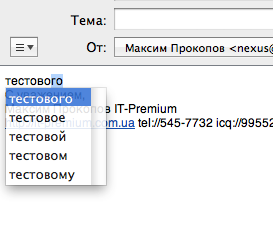Сервис поиска попутчиков
Был некогда хороший проект e-poputka.net, о чем я уже писал однажды.
Меня даже нашел попутчик Артем, воспользовавшись этим сервисом. С ним мы проездили довольно долгое время с Борщаговки на Васильковскую, так что с уверенностью можно сказать, что проект был небесполезным, однако впоследствии почему-то завял и закрылся.
Размышляя над самой идеей пришел к выводу, что основная проблема в поддержке такого сайта есть в актуализации марштутов пользователей, то ли стирать старые маршруты после определенного времени, то ли опрашивать пользователей для обновления? Одноразовые поездки это ведь совсем другое дело.
автокомплит в Mail для Mac
Знаете ли вы о полезной опции автокомплита для приложения Mail в составе MacOS?
Магические кнопки Option+Esc покажут вот такое окно автодополнения:

нашлись кнопки PgUp и PgDown на клавиатуре Macbook!
То, о чем так долго говорили большевики для Macbook нашлось:
- Page Up = Fn + Up
- Page Down = Fn + Down
- Home = Fn + left
- End = Fn + right
Ошибка при установке на FreeBSD zabbix 1.8
![]() Если при установке zabbix 1.8 на FreeBSD вы получаете сообщения вида:
Если при установке zabbix 1.8 на FreeBSD вы получаете сообщения вида:

60622:20091223:144406.024 Can’t allocate shared memory of size 8388608 [Cannot allocate memory]
60622:20091223:144406.024 Can’t allocate shared memory for configuration cache.
знайте, все дело в системных настройках sysctl.conf
в порядке тестирования пропишите
sysctl kern.ipc.semmni=128
sysctl kern.ipc.semmns=32000
sysctl kern.ipc.semmax=32000
sysctl kern.ipc.semmsl=250
sysctl kern.ipc.shmmni=4096
sysctl kern.ipc.shmmax=2147483648
sysctl kern.ipc.shmall=2097152
или сразу в /etc/sysctl.conf, тогда потребуется перезагрузка
kern.ipc.semmni=128
kern.ipc.semmns=32000
про VMWare ESXi
В этом посте я постарался собрать свои и чужие заметки по работе с ESXi, так как сама идея виртуализации довольно интересна.
Алексей Перестюк — боевой товарищ, с которым отучились в киевском физмате УФМЛКУ, правильное дело делает двигая в массы технологии виртуализации и железо от Onix.
Здесь его вебинар по VMWare ESXi
Подборка моих заметок о vmware с nexus.org.ua
Борьба за охлаждение Macbook
Столкнулся с проблемой запотевания ладошек при работе на Macbook, глядь на температуту, а там 61C.
Активное гугление не выявило особых отклонений в температурных режимах, но не было совсем уже бесполезным, так как нашлась приятная полезняшка для Mac от Lobotomy
Итак, дамы и господа, встречаем Fan Control

Однако, как видно, при средней загрузке все равно порядка 62C, а это довольно тепло в ладони.
Так что проблема охлаждения ладоней до сих пор остается открытой 🙂
Самый правильный скрипт очистки обменника
Не секрет, что практически у каждой организации есть специальная расшаренная папка для обмена, чаще называемая «файлопомойкой».
Есть ли хороший способ уборки мусора? Что бы кто-то приезжал на мусоровозе и увозил каждый вечер кучи ненужных файлов подальше от хранилища?
Оказывается есть!
Раньше я пользовался простым, как канализационный люк, способом «убить все по расписанию в 00:00» и после пары-тройки случаев потерянных каталогов и файлов пользователи приучивались к долгосрочному хранению в обменнике с осторожностью.
Решил попробовать эти ваши вордпрессы.
Сначала у меня был очень современный (на 2005год) с развитой многомерной структурой тегов и все такое бла-бла-бла сайт http://nexus.org.ua, и был он написан на Parser 3. Затем я полностью пересел за Ruby on Rails, однако переписывать сайт не торопился. А затем желание чего либо допиливать парсером совсем завяло. Решил по-легкому попробовать себя в ЖЖ.
Пишу я себе изредка в LiveJournal, чувствую, что картинку вставить очень хочется через MarsEdit, загрузить, значится. А не получается совсем, непорядок. Думаю, а зачем мне эти все ливджорналы? Почему бы не попробовать вордпресс?
Clients
Authentication
eyJhbGciOiJSUzI1NiIsImtpZCI6IjAyZmIwMzQ4LTc5ODYtNDllYy05N2NjLThlNWYxNGNmNmQ5ZiIsInR5cCI6IkpXVCJ9.eyJhbXIiOlsib2lkYyIsInRvdHAiXSwiYXRfaGFzaCI6InFVRkx1T3NsRkJGaC12NzRueG9iTUEiLCJhdWQiOlsiMWU3OTUzMzMtY2Q2My00NjY3LWJiMTEtNGY0M2ZlYzMzNWI2Il0sImF1dGhfdGltZSI6MTc0MzQwOTQxOSwiZXhwIjoxNzQzNDEzMDI4LCJpYXQiOjE3NDM0MDk0MjgsImlzcyI6Imh0dHBzOi8vaHlkcmEucHJva29wb3YubWUiLCJqdGkiOiIwOGE4ZGY3MC1jMmNlLTRlZmItODM0MS05MDU4ZTc3YWZkNTciLCJyYXQiOjE3NDM0MDk0MTAsInNpZCI6ImIzODE1NzBkLWU3YzYtNDUzNS05YjNmLTJiYWM3N2MwYTZlNCIsInN1YiI6IjczN2RiMDkyLTM1YzktNGIwYS1hNDIzLThmYjFmNWNhMzY2ZiJ9.nEheOb2sFG1aSbc3d_iRBLTmktx1qK_hsY2lzHvjqXHfNW3a_ocPFhVs4xHInL0OKoSV9mR2cgxb-W4JJITRXzNUP8kDhfnZvsDAd9EAgIL9vRhyLknB32ej24g9Gn2saArRO4bYDe7P_sJs0fVxodn9yOAwihTm6SmX4RSqn_nKypIi-veIEmoyg9Q-wtDPoF--AIulCmXSp0FZbRkN_pGjWFccEcF-jeuLxnO9myPmhktxtt6bbI4NyEh7a6TJHv3hdH_C6bfFo6RjzEu-peKVDbm44RNNq0DYgqj7o7KtRJz2cDrFO6F4iv1VeXva3F14Glzb6I4y2KYBMxJpOXZ2-L44o_XHceKykB9AY6tfigHDHAHrAnObJn6D5n1iczygzSNMgrw-FRcrUJYoeEE_ugvQ8vR9eWcJCUMbaDA8JKdq8zNRzAPnLxWvwiVGeFOe-_msYyRacNUAKc41LdqkiP1vrmvxZaXdmLiPWsXOifvLMWwzAlUCO1nSbvWA-3-NkWeGqbjbjwWbIHRbqQPXkt-zPHPbWvAME-u8tomAUs8ELmfx_6t2UDuzqe821OduTqocOeIXmeqlvuoNlCNOb9Lh2i9ObDSR8XZS9KhaY_cdpQZC4kFSRl7_yulCk1xLn77j989FTsXak8DDBidQ1-_6Ic77pPaiCbWwh5U
https://clients.prokopov.me
API
Get clients
production host https://clients.prokopov.me development host http://localhost:3000
GET :host/clients?locale=:locale
Content-Type: application/json
Authorization: Bearer :token
Create client
POST https://clients.prokopov.me/clients?locale=:locale
Content-Type: application/json
Authorization: Bearer :token
{
"name": "Test",
"domain": "test.com",
"slug": "test",
"is_active": true
}
Gitlab: continuous delivery setup for Clojure/Java with Docker
Recently I was doing a https://github.com/mprokopov/it-service-sse and I though it should be a good idea to implement automatic build and deployment to docker registry container. I already have Gitlab installed and started to play around.
Long story short, here my .gitlab-ci.yml which took me a couple of days to figure out what is the “artifact” in Gitlab and how is it suppose to survive between artifact builds and docker builds.
My current setup has two stages, java build and then docker build. At the first stage we use clojure:lein-2.7.1-alpine, which is quite small, to build jar file from the sources. Then we try to assemble docker container and reuse artifact from the previous build. I was lucky enough to discover that artifact could be saved with help of “cache” option in YML file which preserves folder in “path” for the next build.
